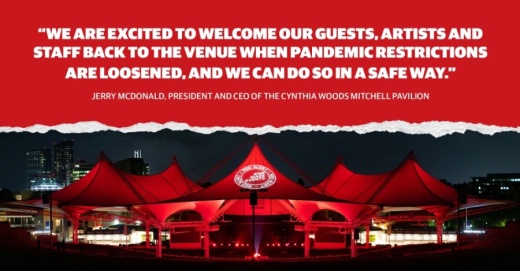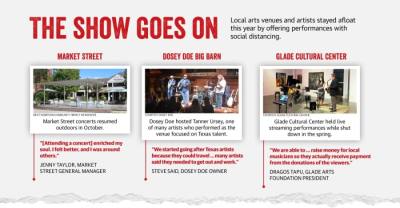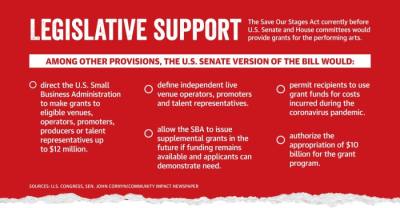Over the past seven months, however, some venues have reopened in an attempt to operate safely while mitigating financial losses.
Although some venues, such as the Pavilion, were able to receive federal funds to help address losses, the nonprofit organization Americans for the Arts, a national organization supporting the arts, has reported the total financial effects on arts organizations in Texas is at least $134 million based on its surveys.
“About 95% of our calendar became empty,” Dosey Doe owner Steven Said said.
Changing with the times
Among the performing arts venues able to reopen in June was country music venue Dosey Doe, located on I-45. According to Said, most national and international performers had canceled their shows for the remainder of the year. As a way to keep open, Said said he has shifted his focus to Texas talent.
“We started going after Texas artists because they could travel, and fortunately, many artists said they needed to get out and work,” Said said.
Dosey Doe added health screenings at the entrance prior to shows, including sanitation stations, mask requirements and temperature checks.
“I think we created a level of comfort that everybody felt good about,” Said said. “I would say [for] about 98% of the artists that have come to play here since June, this was their first event to play. It’s been a rather joyous event with every show that has happened here.”
Other venues, such as retail center Market Street, which hosts a variety of live events, and the Cynthia Woods Mitchell Pavilion, which is owned and operated by nonprofit The Center for the Performing Arts at The Woodlands, have largely remained closed to public performances since March. However, the spaces have still been used for community events, such as family movie nights with large LED screens or playing host to COVID-19 antibody testing.
Jerry MacDonald, president and CEO of the Pavilion, said the virus has affected the venue’s revenue stream.
“Live events are a major contributor to our revenue stream, and without events this season, we have lost about 99% of our revenue,” MacDonald said. “We were fortunate to receive some government assistance that helped cover payroll expenses for the first three months. Since then, we have utilized previous years’ revenue and funds from our savings to help cover fixed expenses, such as payroll, utilities and insurance.”
The Pavilion was among the businesses in The Woodlands area to receive between $350,000 and $1 million in funding from the federal Paycheck Protection Program in July, which was rolled out as a loan that could be forgiven to help organizations pay their employees. Dosey Doe was also a recipient, and funding information from the U.S. Small Business Administration indicates it received between $150,000 and $300,000.Although not primarily an entertainment venue, Market Street General Manager Jenny Taylor said the retail space was able to get its fall concert series going, and socially distanced areas were designated for the space. She said Market Street typically hosts around 150 events annually, but nearly all of them had been eliminated until the start of October.
“As somebody who has had cabin fever over the past few months, I can’t describe what it was like for me personally to attend a concert,” Taylor said. “It enriched my soul. I felt better, and I was around others.”
Among area performing arts organizations in The Woodlands area, Spring-based Class Act Productions canceled most of its performances and converted its summer stock workshop into a virtual event, according to a statement from Brian Weaver, president of the organization’s board of directors.The nonprofit lost $65,000 of expected income, he said in the statement. However, some in-person performances resumed in the fall.
Pivoting to virtual formats
From June to October, the state limited performing arts to a maximum of 50% capacity. Gov. Greg Abbott increased that amount to 75% in October. In light of reduced capacity, some venues began to offer virtual experiences.
Anina Moore, director of communications for the Texas Commission of the Arts, said many venues in the state held online or streaming events, but those often saw lower returns on ticket sales due to the generally lower costs of entry.
As part of its mission, the TCA provides grants to arts organizations, including $668,500 in Coronavirus Aid, Relief and Economic Security Act funds to 491 organizations this year. Two in Montgomery County were among those that received funds this year, according to the TCA.
The Woodlands Arts Council’s major annual fundraiser, The Woodlands Waterway Arts Festival, was postponed from April to October and was ultimately held as a free online event. Those who have tickets from April can use their tickets for next year’s event, Executive Director Jenny Wright said.
Wright said about 100 of the original 200 artists scheduled participated. The new format allowed artists to sell items through the weekend while interacting and holding demonstrations online.“The biggest advantage is we’re going to reach an audience that’s never been able to come out to the festival before,” she said.
Online sales will continue through the holidays, and future shows may include a mix of live and virtual experiences, she said.
The Glade Arts Foundation, a nonprofit organization that focuses on providing fine arts experiences, has also shifted its focus to virtual efforts.“The music virtual offerings have been received very, very well,” Glade Arts Foundation President Dragos Tapu said. “We ... gave back to the musicians 100% of the money that came in.”
Woody Witt, a performer at Glade Cultural Center and the owner of a Houston jazz club, Cezanne, said the loss of live performance has been difficult for artists.“It is really a trivial amount when you compare it to what has been lost for most people,” Witt said. “Being able to be on stage with other musicians making music together ... [and then] having that taken away is traumatic.”
Moving forward
While the year has been hard for many venues, some said they are remaining cautiously optimistic going into 2021. According to Said, the past two months for Dosey Doe have been profitable, and many national and international artists have rescheduled their performances at the location for early next year.
According to a survey report from Americans for the Arts 96% of the 1,387 organizations that responded have canceled events; the median organization lost around 2,000 attendees. The organization reported that total revenue lost across the country in the arts is around $14 billion. “People are genuinely still concerned about [coronavirus] until a vaccine is out. ... We are not going to see the numbers back, even when we have the big shows back,” Said said.
MacDonald said the Pavilion is looking forward to a strong year in 2021, as many of the performers scheduled for this year were rescheduled.
He added that the Pavilion was able to focus on completing internal projects, including free virtual educational outreach programs for area families, while the venue was closed to the public.
“Our venue is at the center of a large economic ecosystem that supports dozens of other businesses in our area,” MacDonald said. “Although we do not know what the immediate future holds, we have been working with artists and producers to find safe and comfortable ways to bring back live performances.”
Support could come in the form of legislation like that proposed in the U.S. Senate and House in July. The Save Our Stages Act, which is currently in Senate and House committees, would provide grants to eligible live venues and talent.
Another effect of the economic strain of the coronavirus on the region was the postponement of the addition of a new performing arts center that had been discussed for The Woodlands.The township’s board of directors had approved looking into the viability of a new cultural center at a December meeting, but in July, it put those plans on hold at the request of the Pavilion, which was to partner with the township’s convention and visitors bureau on the topic.Witt said he believes in the necessity of art as a whole, but he does have concerns about the long-term ramifications the pandemic will have on the arts.“I’m a little confused and concerned about what the future is going to hold,” Witt said. “I believe in music. I believe in art. I believe it’s a necessary part of our society and our culture, and I hope that people are more aware in recognizing that and we are able to come back in person because I just think it’s a necessary part of life.”
Additional reporting by Vanessa Holt
Editor's note: The spelling of Jerry MacDonald, president and CEO of The Cynthia Woods Mitchell Pavilion, has been corrected throughout the story. It incorrectly appeared in print as McDonald.







